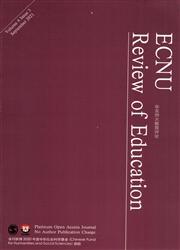Assessing ChatGPT’s Educational Capabilities and Application Potential
IF 2.6
Q1 EDUCATION & EDUCATIONAL RESEARCH
引用次数: 0
Abstract
Purpose ChatGPT is a generative artificial intelligence (AI) technology that can solve multiple complex tasks. ChatGPT-4 can facilitate educational empowerment in China through technology to understand and generate Chinese text. Although ChatGPT's benefits have been widely discussed, its educational capabilities have not been systematically assessed. This study provides evidence of and insights into the educational applications of AI tools in China. Design/Approach/Methods This study uses various tests to systematically assess the latest iteration of the AI chatbot ChatGPT-4, including the Watson-Glaser Critical Thinking Appraisal (WGCTA), Five Core Competencies Questionnaire, and written test of China's 2022 National Teacher Certificate Examination (NTCE). Findings The WGCTA results suggest that ChatGPT requires strong critical thinking. Compared with the other four competencies, the tool showed a lower aptitude for creativity. Regarding its educational applications, ChatGPT performed well on the 2022 NTCE written test. As technology enhances, ChatGPT and similar AI tools have potential applications in China for lesson planning, student self-learning, classroom interaction, and checking assignments. Originality/Value This study systematically tested ChatGPT at a logical level and assessed its core competencies and educational applications. The study innovatively used 2022 NTCE data to test ChatGPT, with results providing support for the application of generative AI in future curricula and instruction in China.评估ChatGPT的教育能力和应用潜力
ChatGPT是一种可以解决多个复杂任务的生成式人工智能(AI)技术。ChatGPT-4可以通过技术来理解和生成中文文本,从而促进中国的教育赋权。虽然ChatGPT的好处已经被广泛讨论,但它的教育能力还没有得到系统的评估。本研究为人工智能工具在中国的教育应用提供了证据和见解。设计/方法/方法本研究使用各种测试系统评估最新迭代的人工智能聊天机器人ChatGPT-4,包括沃森-格拉瑟批判性思维评估(WGCTA),五项核心能力问卷,以及中国2022年国家教师资格考试(NTCE)的笔试。WGCTA结果表明,ChatGPT需要很强的批判性思维。与其他四种能力相比,工具显示出较低的创造力。在教育应用方面,ChatGPT在2022年NTCE笔试中表现良好。随着技术的进步,ChatGPT和类似的人工智能工具在中国的课程规划、学生自学、课堂互动和检查作业方面具有潜在的应用前景。本研究在逻辑层面对ChatGPT进行了系统测试,并评估了其核心竞争力和教育应用。本研究创新性地使用2022年NTCE数据对ChatGPT进行了测试,其结果为生成式人工智能在中国未来课程和教学中的应用提供了支持。
本文章由计算机程序翻译,如有差异,请以英文原文为准。
求助全文
约1分钟内获得全文
求助全文
来源期刊

ECNU Review of Education
Social Sciences-Education
CiteScore
4.90
自引率
0.00%
发文量
41
审稿时长
10 weeks
 求助内容:
求助内容: 应助结果提醒方式:
应助结果提醒方式:


